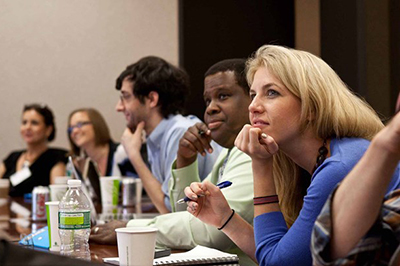Although it’s tempting to head to the pool or beach for most of the summer consider setting aside some time to participate in a pre-college or specialized summer program.
These opportunities to have fun and learn about the next stages of your life usually take place after your sophomore or junior year. Not only can you earn college credit for these courses but according to David Lowitz director of marketing and research for National Student Leadership Conference (NSLC) they are also opportunities to “experience firsthand a day in the life of a chosen career and can be incredibly useful in helping students form an educational and professional career path.”
Jennifer Daskevich executive director of National Honors Convocation agrees adding, “This is a preview of the experiences that lie ahead — a time for students to prepare for success in college and a career.”
While you may think there’s plenty of time to choose a career (and right now you’re busy with coursework prepping for standardized tests and involved in as many extracurricular activities as possible) these summer programs will expose you to possible career options and give you a taste of what college life will be like.
Not All Programs Are the Same
From working on Capitol Hill to save the environment on to sports and entertainment management to fine arts summer programs offer a wide variety of options for interested students. Students should research programs knowing that two options are available: college-offered courses or programs and institution-offered programs.
Elizabeth Sherman executive director of Presidential Classroom suggests you think about which “interests appeal to you and what motivates you. Look inside yourself and imagine who you want to be in the coming years.” Keep this in mind as you consider which type of program would suit you best.
College-Offered Programs
Colleges and universities typically offer classroom-based programs. Some concentrate heavily on general education giving students a well rounded experience and allowing them to get a sense of what college will be like. Other programs focus on certain families of study — think of it like picking a major such as communications engineering or theater. These programs which mimic college life tend to be longer (six to eight weeks) and students can try out more than one course and even experience dorm life. This time away from home allows you to make limited choices in a safe environment — great practice before you’re on your own!
Here students delve into academics and may earn college credit. The programs typically facilitate students narrowing their focuses — if you can’t decide whether to go into food sciences or social science taking a crack at organic chemistry or feminist history might help you make up your mind.
Be sure to search the Web for programs offered at college campuses. For example the Julian Krinsky Camps and Program website extensively describes more than a dozen pre-college program subjects available at Princeton University such as anthropology economics and investing and philosophy. Video a main feature of the site demonstrates several aspects of the student experience — from debating and gourmet cooking to enjoying the campus and city tours. These clips reveal program emphasis on “class discussions…evaluating key course concepts…and projects and presentations that will help [students] prepare for the demands of collegiate academics.”
Institution-Offered Programs
Options that don’t revolve around colleges include programs offered by nonprofits leadership development organizations government and other agencies.
Unlike college-offered programs institution-offered programs are more appropriate for students who have a track in mind and would prefer more outside-the-classroom experience.
According to Lowitz these programs offer “hands-on experiential learning with a combination of academics leadership development social activities and sightseeing” and are typically shorter (one to three weeks). Often some organizations offer the same program in more than one city.
Although these programs don’t necessarily give students a slice of college life they do allow students to connect with top-level leaders in business and government. Sponsoring institutions strive to provide their students with new and realistic perspectives about their interests and future careers by giving them “hands-on” time with their interests of choice. Getting a glimpse into your possible future is invaluable.
For example Presidential Classroom offers students who are interested in politics government public policy international affairs and related topics the opportunity to visit Washington DC to learn about public leadership alongside national leaders. The experience is highly interactive and the instructors work for the federal government.
While students work hard they also get a taste of the area’s culture visiting monuments museums and historic landmarks — it’s the ultimate field trip as students experience what it would be like to work and live in DC culture.
According to Sherman the newest trend involves global health the environment and how students can positively change society. Students are also challenged to think about what policies should and can truly change the world. Sherman points out that the programs “show you something different” from the typical high-school experience.
One of the greatest advantages of participating in these programs is that they evolve as the needs of students and society change. Lowitz points out “At the NSLC we see the future of summer programming as seeking to provide students with a program that is tailored to their interests and aspirations while still enabling them to engage with the larger student body.” With this goal in mind NSLC they evolve as the needs of students and society change. Lowitz points out “At the NSLC we see the future of summer programming as seeking to provide students with a program that is tailored to their interests and aspirations while still enabling them to engage with the larger student body.” With this goal in mind NSLC Partnering with professionals from a wide range of career fields draws students to the National Honors Convocation. Daskevich says the 10-day programs which include law medicine television and film and business are “very hands-on” allowing students to “present trials perform dissections and diagnostic patient studies shoot short films or create business plans.” Daskevich emphasizes the need for students to use their summer hours wisely as college is becoming more and more competitive.
Finding a Summer Program
When searching for a program start with a close look at your interests and ideas about the future. The next step is to begin a search with your guidance counselor. Most counselors have a wealth of information about programs and receive regular updates from program coordinators and other professional organizations.
Consult with your parent or guardian and do some Internet research. Browse through college and other program sites to see what interests you. You might also consider testimonials and other online postings. You can find program ratings online posted by a variety of people from program experts to your high school peers. Ask your guidance counselor if your county school system has a program search website.
Most importantly find out what your friends and family know or have experienced first-hand. The most reliable source is word-of mouth and those who know you best can help you gauge whether or not the program will be a good fit. When you find a program that appeals to you remember to apply early (the programs can be competitive) and ask about scholarships.
As Sherman concludes, “College is the means to an end. When you make choices think about what direction you want to go in.” These programs are designed to guide your future. Gather all you can from the experience and enjoy the journey — you may even get a chance to study by the pool!
Sarah S. Cox is a writer editor and graphic designer living in Northern Virginia.



